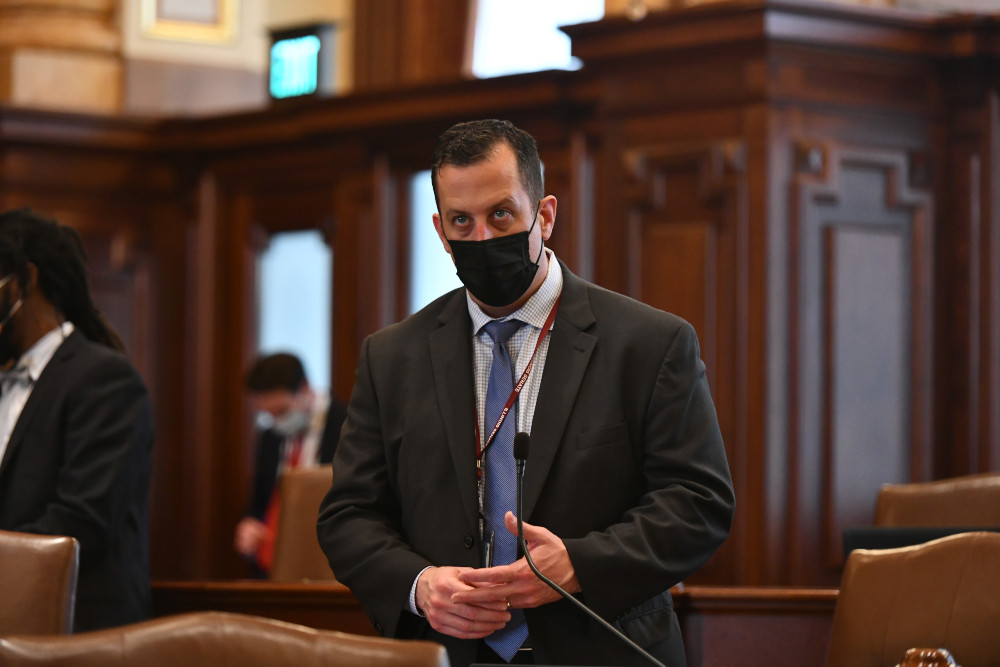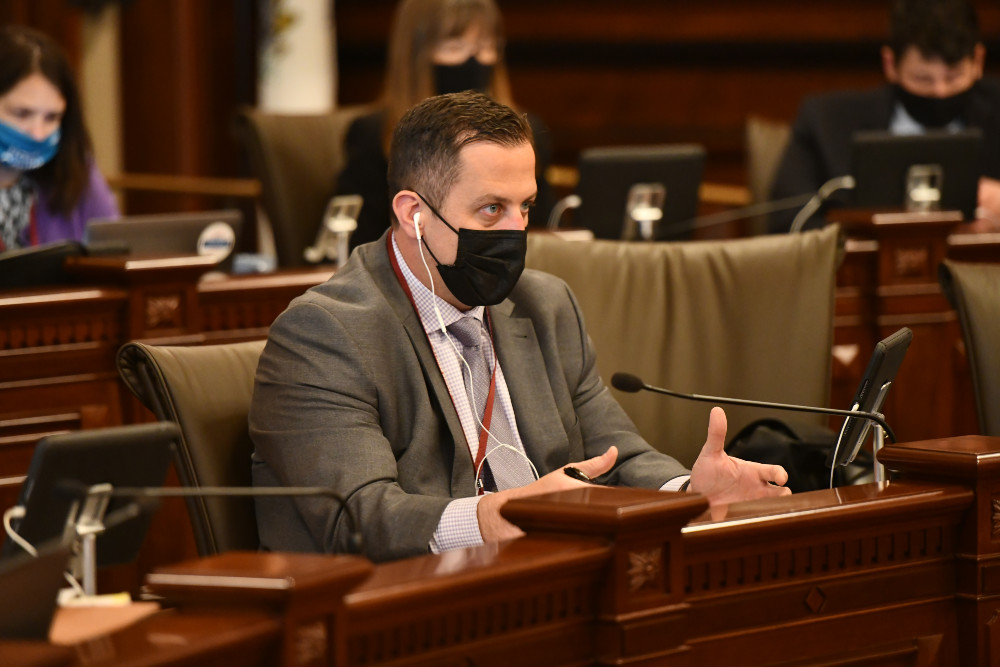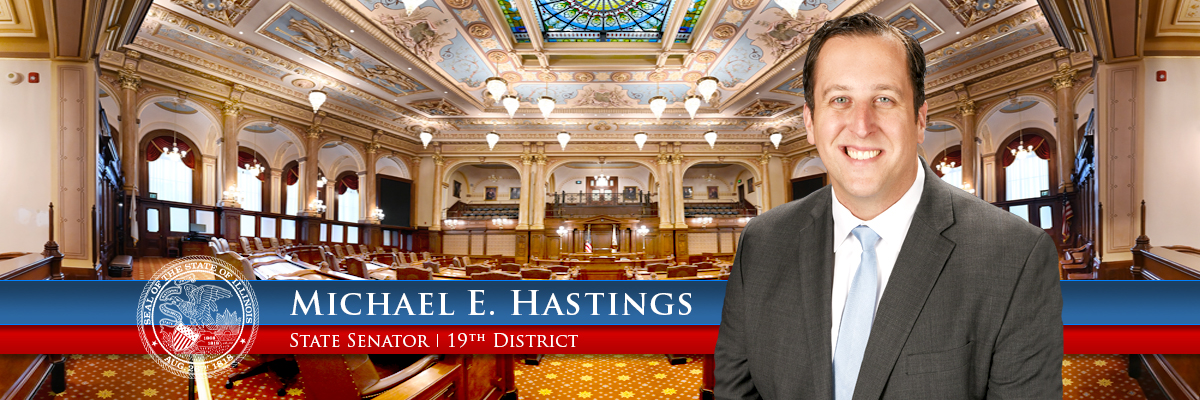- Details
- Category: Press Releases

SPRINGFIELD – Fitch Rating released a revised outlook on Illinois’ financial forecast earlier this week, a move several suburban lawmakers praise as a direct result of responsible spending.
“After years of fiscal irresponsibility and chaos under the previous governor, these rating upgrades are an example of what we can accomplish by working together to implement responsible budgets,” said State Senator Michael E. Hastings (D-Frankfort).. “This is a vote of confidence in the future of our state.”
“Legislative actions have consequences and we are seeing the choices made by the General Assembly over the past several years yield positive results,” said State Senator John Connor (D-Lockport).“The bottom line is that this is a concrete example of fiscal responsibility creating an incredibly bright future for our state.”
“Despite navigating a global pandemic, we were able to cut spending by nearly $1 billion since 2020 while simultaneously meeting our pension obligations and increasing investments in K-12 education by $350 million,” said State Senator Meg Loughran Cappel (D-Shorewood).. “It is incredibly gratifying to see positive results stem from responsible budget action.”
Fitch’s is the third ratings agency to upgrade the state’s forecast, in addition to Standard and Poor’s and Moody’s.
Highlights from Fitch’s analysis include:
- “Recent fiscal results and the enacted fiscal 2022 budget suggest further improvements in operating performance and structural balance in the near and medium-term that could support a return to the pre-pandemic rating or higher.”
- “Recent improvements including reduction in accounts payable and enacting plans for early retirement of federal pandemic loans, signal improvement in budget management.”
- “Broadly, the state reports a $1 billion reduction in total general fund spending for fiscal 2022 ($42.3 billion) versus the current services estimate provided in November 2020. General fund base operating spending remains flat in the fiscal 2022 enacted budget versus fiscal 2021 at $30.8 billion. Funding for K-12 and higher education is up 3%, including a $350 million increase for K-12.”
- Details
- Category: Press Releases

FRANKFORT – Additional improvements to South Suburban roads and bridges are set to commence in 2022 thanks to the bipartisan Rebuild Illinois program.
The plan, championed by State Senator Michael E. Hastings, will provide residents of the South Suburbs with faster commutes, safer intersections, and fewer potholes.
“When we passed the Rebuild Illinois program, we made the largest long-term infrastructure investment in the history of our state,” Hastings said. “It is thrilling to witness that investment in public safety and job creation begin to pay off.”
2022 will see the commencement of 13 projects totaling $70,948,000 in investments along I-57 and I-80, both of which traverse a large portion of the 19th District.
These projects are a part of IDOT’s Multi-Year Plan, which outlines $20.7 billion in statewide construction projects for the next six fiscal years through Rebuild Illinois. Of that total, $3.32 billion will be invested in statewide projects that begin in 2022, spurring the state’s COVID-19 recovery effort.
“In 2019, we could not have known how desperately our economy would need the stimulus a massive infrastructure program can provide,” Hastings said. “Rebuild Illinois is going to play a key role in our state’s recovery. Our people have the chance to find good paying, sustainable jobs that can lift them into prosperity after such a turbulent year.”
For a complete list of upcoming projects in the 19th District, visit IDOT’s website.
- Details
- Category: Press Releases

SPRINGFIELD – Workers at high hazard facilities could soon be required to undergo advanced safety training thanks to legislation passed by the Senate Executive Committee yesterday.
State Senator Michael E. Hastings (D-Frankfort) is the chief sponsor of this initiative.
“Safety training is crucial at every job site, but the need at facilities where workers are handling dangerous substances is especially prudent,” Hastings said. “Those who have gone through proper training are statistically less likely to be at risk of making a mistake that could result in an accident. We cannot afford to lose lives on the job site due to neglect, and we certainly cannot afford to let these dangerous chemicals seep into our communities.”
This initiative is a response to a 2012 Chevron refinery explosion and subsequent fire in Richmond, Cal. According to the U.S. Chemical Safety and Hazard Investigation Board, approximately 15,000 people from the surrounding communities sought medical treatment at nearby medical facilities for ailments including breathing problems, chest pain, shortness of breath, sore throat, and headaches following the incident. Approximately 20 of these people were admitted to local hospitals as inpatients for treatment.
Under House Bill 3437, the Illinois Department of Labor would be required to develop a curriculum of approved advanced safety training for workers at high hazard facilities. These building and construction contractors would be required to pay prevailing wage and use a skilled and trained workforce to perform all onsite work at petroleum refining facilities, petrochemical manufacturing facilities, ethyl alcohol manufacturing facilities, and basic organic chemical manufacturing facilities. If these contractors fail to do so, they could face a monetary penalty.
In addition to these safety provisions, two measures to increase workforce diversity at these facilities would be implemented.
No pre-apprenticeship or apprenticeship program would be allowed to require a recommendation from a union member or any other person as a condition of acceptance. Job site demographics would also be reported and compared to demographics of the county the facility resides in. If the workforce demographics do not match, the apprenticeship program or contractor must make it a priority to achieve this goal.
“Job sites ought to reflect the diversity of our neighborhoods and I strongly encourage all contractors to take that into consideration,” Hastings said. “A diverse work force is a skilled work force.”
This legislation now moves to the full Senate for consideration.
- Details
- Category: Press Releases

SPRINGFIELD – To prevent the exploitation of veterans and promote the availability of free service programs, State Senator Michael E. Hastings (D-Frankfort) passed a measure through the Senate Veterans Affairs Committee Tuesday that seeks to penalize deceptive service providers.
“The past year has demonstrated just how easy it can be for those with malicious intent to take advantage of the innocent,” Hastings said. “It is our obligation to protect our veterans from these bad actors.”
Under House Bill 3865, any advertisement for veteran and military service benefits must include that these services are available free of charge from federal, state and county veteran service offices.
Additionally, the failure to disclose the availability of veteran service programs in advertisements relating to these services would be declared unlawful.
“This is a step we can take to ensure our veterans are not taken advantage of,” Hastings said. “They need to know their government stands ready to provide quality services, which they have earned many times over.”
This legislation awaits consideration by the full Senate.
More Articles …
Page 35 of 87


